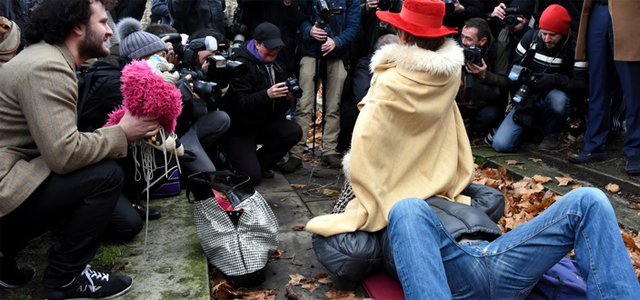The Censorship of Porn and Protest

The lawns outside London’s Houses of Parliament were filled with protesters holding signs that read “Shame on you, we come too!” and chanting lyrics from Monty Python’s “Sit on My Face.” The sixty or so people had gathered to protest the alignment of two regulatory bodies in the United Kingdom — that of the British Board of Film Classification (BBFC) and the Authority for Television On Demand (ATVOD) under the Audiovisual Media Services Regulations 2014, which in effect has made a number of acts in web-stream pornography produced in the U.K. illegal.
These acts include the use of canes to inflict pain; “aggressive” whipping; choking; physical restraint (which includes a number of types of bondage); penetration with any object deemed to be associated with violence; physical or verbal abuse whether the subject consents or not; humiliation (again, even if it’s consensual); watersports (urinating on a person for the purpose of arousal); role-playing as minors; female ejaculation; face-sitting (the act of providing or simulating oral sex on a person, usually a woman, who lowers herself over another’s face).
The act has a number of implications — some of which reach far beyond porn production in the U.K. — but today, the protest focused on what is, without a doubt, the singling out of acts of female sexuality in pornography — acts which are legal when done out of the views of cameras.
It’s unlikely that the media would have paid much mind to the protestors gathered today had attendees not played up the titillating factor by dressing provocatively, carrying sexually-suggestive signs, and acting out some of the banned acts. But generating interest by titillating has its downside: that the media will only focus on these things instead of seriously investigating the threats to free speech that protestors so clearly see.
ATVOD has grown immensely in power since its inception in 2009, going from a small outfit under the supervision of the Office of Communications which is responsible for regulating the content of videos that are available to U.K. viewers “on-demand,” to a largely independent body with sweeping powers that has targeted online pornography as its true adversary. Currently, ATVOD is pressuring payment processors and banks to make it possible to restrict the access of U.K. citizens to all online pornography that doesn’t comply with its vision of what’s acceptable, effectively leveling economic sanction against producers outside of its jurisdiction that it cannot force to comply with its regulations.
But there’s another threat facing those who espouse the freedom to see their desires play out on their screens. On the morning of the protest, Charlie Rose — a sex workers’ rights activist and the organizer of the protest — logged in to her YouTube account to discover that it had been suspended by Google without warning. Silicon Valley, it seemed, had decided to close one of the most effective avenues available to grassroots political activists for reasons they would not divulge.
According to Rose, the last video that was uploaded to her channel contained information for sex workers to stay safe while working and how to file taxes. In a message to me, Rose described the video as “educational.” Other videos on her channel include: an interview with Rose on the Wright Stuff, a performance by her for the anti-stigma effort the Sex Workers Opera, and other educational videos for sex workers.
Sex work is not illegal in the United Kingdom. Rose has never received a warning, or had content removed from her channel for violating the YouTube guidelines prior to this account suspension. When YouTube’s guidelines are examined, the only rule that appears to apply is: “Don’t post videos which encourage others to do things that may cause them to get badly hurt, especially kids. Videos showing such harmful and/or dangerous acts may be age-restricted or removed depending on their severity.”
This isn’t the first time that Google has confused anti-stigma and sex workers’ rights efforts with “promoting prostitution.” In 2011, Google cancelled the AdWords campaign of the Dublin-based Turn Off the Blue Light non-profit, whose site focused exclusively on lobbying for sex workers’ rights. In that case, Google eventually relented, but it’s always been a battle to get the tech giant to understand that standing up for political dissidents includes standing up for sex workers, whether their governments have decriminalized this form of labor or not.
UPDATE: When Rose wrote YouTube on December 13 asking for information about her suspension, she received a form letter in response:
Hi there,
Thank you for your account suspension appeal. We have decided to keep your account suspended based on our Community Guidelines and Terms of Service. Please visit https://www.youtube.com/t/community_guidelines for more information.
Sincerely, The YouTube Team
After I exchanged a few messages with people at the tech giant, the account was unsuspended on December 17, which coincides with the International Day to End Violence Against Sex Workers. Neither I nor Rose received any explanation for the suspension or the restoration of the account.
However, less than a week later, the account was suspended once more — again, without reason.
We live in a world where some stigmatized groups have finally achieved a rightful place in the streets where they can congregate and bring their grievances to the state. But just as they have attained this, they’re finding that new, much more effective avenues to change are being denied to them by powers that aren’t under any obligation to the public.
Header image by See Li (Flickr, CC BY-NC 2.0).






